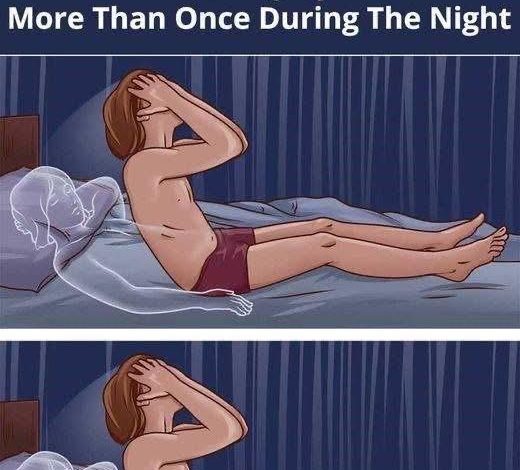Why You’re Waking Up in the Middle of the Night and How to Fix It

Waking up in the middle of the night can feel like an endless battle, leaving you feeling exhausted and impacting your daily productivity. According to a Sleep Medicine study, a significant portion of the American population, approximately one-third, experiences these disruptive awakenings at least three times a week. This phenomenon, often termed “sleep maintenance insomnia,” can significantly impact your overall well-being. Understanding the underlying causes is crucial for developing effective strategies to reclaim your peaceful slumber. This article will delve into eight common culprits behind nighttime awakenings and provide actionable tips to help you conquer the night and enjoy uninterrupted sleep.
ADVERTISEMENT
1. Environmental Disturbances: A Symphony of Discomfort
ADVERTISEMENT
Creating an optimal sleep environment is paramount for a restful night. As Dr. Rita Aouad, a sleep medicine specialist, emphasizes, environmental factors such as temperature, noise, and light can significantly disrupt your natural sleep-wake cycle. If you find yourself waking up due to discomfort, consider these strategies:
ADVERTISEMENT
- Temperature Control: Utilize fans, open windows, or air conditioning to maintain a cool and comfortable temperature in your bedroom.
- Noise Reduction: Invest in earplugs, use a white noise machine, or consider soundproofing your bedroom to minimize distractions.
- Light Control: Invest in blackout curtains or eye masks to block out any intrusive light sources, ensuring a dark and serene sleep environment.
2. Anxiety: The Silent Saboteur of Sleep
Anxiety can be a significant contributor to nighttime awakenings. Dr. Nesochi Okeke-Igbokwe highlights that anxiety can manifest in various ways, such as nocturnal panic attacks or a racing heartbeat, abruptly disrupting your slumber. If anxiety is keeping you up at night, consider these strategies:
- Professional Guidance: Seek professional help from a therapist or counselor specializing in anxiety disorders.
- Medication Management: Consult with a psychiatrist to explore potential medication options for managing anxiety symptoms.
- Relaxation Techniques: Incorporate relaxation techniques into your daily routine, such as meditation, deep breathing exercises, or progressive muscle relaxation, to calm your mind and body.
3. The Nocturia Dilemma: Frequent Trips to the Bathroom
Frequent nighttime awakenings to use the bathroom, a condition known as nocturia, can significantly disrupt sleep. This can be attributed to various factors, including excessive fluid intake before bedtime or underlying medical conditions such as diabetes or an enlarged prostate.
- Fluid Intake Management: Limit fluid intake in the hours leading up to bedtime.
- Medical Evaluation: Consult with a healthcare professional to rule out any underlying medical conditions that may be contributing to nocturia.
4. Alcohol: A Temporary Solution with Lasting Consequences
While alcohol may initially induce drowsiness, it often leads to fragmented and restless sleep later in the night. Alcohol consumption can disrupt normal sleep architecture, increasing the amount of time spent in lighter stages of sleep and making you more susceptible to awakenings.
- Alcohol Abstinence: Avoid alcohol consumption for several hours before bedtime.
- Hydration: Maintain adequate hydration throughout the day to prevent dehydration, which can contribute to nighttime awakenings.
5. Sleep Apnea: The Silent Thief of Breath
Sleep apnea, characterized by repeated interruptions in breathing during sleep, is a common sleep disorder that can significantly impact sleep quality. If you frequently wake up gasping for air or experience excessive daytime sleepiness, you may be suffering from sleep apnea.
- Sleep Study: Consult with a sleep specialist to undergo a sleep study (polysomnography) to diagnose sleep apnea.
- CPAP Therapy: If diagnosed with sleep apnea, consider using a Continuous Positive Airway Pressure (CPAP) machine, which can help maintain open airways during sleep.
6. Hyperthyroidism: The Overactive Thyroid
An overactive thyroid gland (hyperthyroidism) can significantly disrupt sleep patterns. Symptoms such as a racing heartbeat and excessive sweating can interfere with your ability to fall asleep and stay asleep.
- Hormone Testing: Consult with your doctor to undergo blood tests to assess your thyroid hormone levels.
- Medication Management: If diagnosed with hyperthyroidism, your doctor may prescribe medications to regulate thyroid function.
7. Dietary Disruptions: The Impact of Eating Habits
Your eating habits can have a profound impact on your sleep quality. Consuming heavy meals close to bedtime can lead to indigestion and heartburn, while skipping meals can cause low blood sugar levels, which can awaken you during the night.
- Balanced Diet: Maintain a balanced diet throughout the day, ensuring regular mealtimes and avoiding large meals before bedtime.
- Light Evening Snacks: If you experience hunger pangs before bed, opt for a light and easily digestible snack.
8. Restless Legs Syndrome: The Uncontrollable Urge to Move
Restless Legs Syndrome (RLS) is a neurological disorder characterized by uncomfortable sensations in the legs, often accompanied by an irresistible urge to move them, particularly at night. These uncomfortable sensations can significantly disrupt sleep.
- Medical Consultation: Consult with a neurologist to discuss potential treatment options for RLS, which may include iron supplements, medications, or lifestyle modifications.
By addressing these potential causes and implementing the recommended strategies, you can significantly improve your sleep quality, wake up feeling refreshed and rejuvenated, and enhance your overall well-being. Remember, consistent efforts and a personalized approach are key to conquering the night and reclaiming your restful sleep.
Disclaimer: This article is for informational purposes only and should not be considered medical advice. Always consult with a healthcare professional
for any health concerns or before making any significant changes to your lifestyle or medical regimen.






